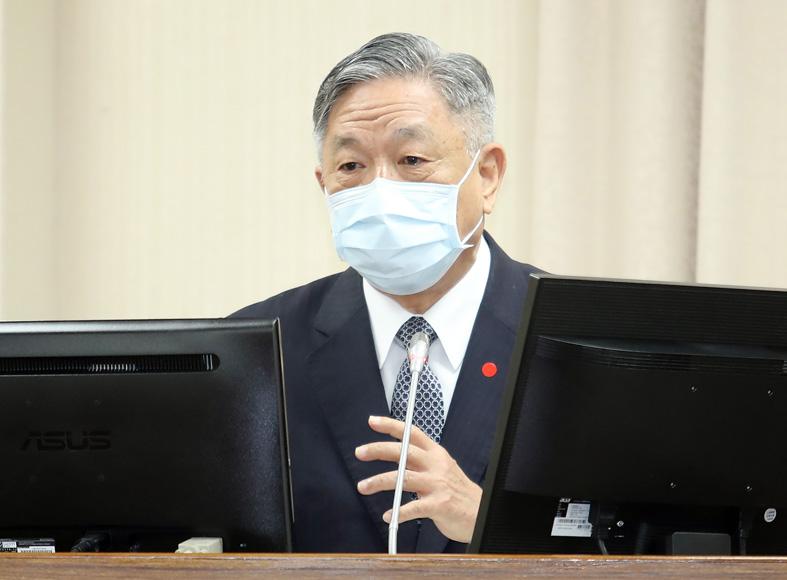US Secretary of State Antony Blinken on Sunday said that the US is concerned about China’s aggressive actions against Taiwan and remains committed to ensuring Taiwan “has the ability to defend itself.”
“What we’ve seen, and what is of real concern to us, is increasingly aggressive actions by the government in Beijing directed at Taiwan, raising tensions in the straits,” Blinken said in an interview with NBC’s Meet the Press.
He said Washington has a longstanding bipartisan commitment to Taipei under the Taiwan Relations Act to ensure Taiwan “has the ability to defend itself,” and to make sure the US is sustaining peace and security in the western Pacific.

Photo: CNA
“We stand behind those commitments,” he said.
However, Blinken refused to comment on a hypothetical situation when asked if the US would respond militarily to a potential Chinese attack on Taiwan.
Meanwhile, former US secretary of state Mike Pompeo yesterday posted a photograph of himself eating Taiwanese dried pineapple on Twitter, his latest public declaration of support for Taiwan.
The Ministry of Foreign Affairs last month said that it had not yet discussed the possibility of Pompeo visiting Taiwan.
However, when asked yesterday by Democratic Progressive Party Legislator Wang Ting-yu (王定宇) about the possibility of a visit to Taiwan by Pompeo some time this year, Deputy Minister of Foreign Affairs Tien Chung-kwang (田中光) nodded and said that the ministry “is working on it.”
Additional reporting by Lu Yi-hsuan

A Chinese aircraft carrier group entered Japan’s economic waters over the weekend, before exiting to conduct drills involving fighter jets, the Japanese Ministry of Defense said yesterday. The Liaoning aircraft carrier, two missile destroyers and one fast combat supply ship sailed about 300km southwest of Japan’s easternmost island of Minamitori on Saturday, a ministry statement said. It was the first time a Chinese aircraft carrier had entered that part of Japan’s exclusive economic zone (EEZ), a ministry spokesman said. “We think the Chinese military is trying to improve its operational capability and ability to conduct operations in distant areas,” the spokesman said. China’s growing

Nine retired generals from Taiwan, Japan and the US have been invited to participate in a tabletop exercise hosted by the Taipei School of Economics and Political Science Foundation tomorrow and Wednesday that simulates a potential Chinese invasion of Taiwan in 2030, the foundation said yesterday. The five retired Taiwanese generals would include retired admiral Lee Hsi-min (李喜明), joined by retired US Navy admiral Michael Mullen and former chief of staff of the Japan Self-Defense Forces general Shigeru Iwasaki, it said. The simulation aims to offer strategic insights into regional security and peace in the Taiwan Strait, it added. Foundation chair Huang Huang-hsiung

PUBLIC WARNING: The two students had been tricked into going to Hong Kong for a ‘high-paying’ job, which sent them to a scam center in Cambodia Police warned the public not to trust job advertisements touting high pay abroad following the return of two college students over the weekend who had been trafficked and forced to work at a cyberscam center in Cambodia. The two victims, surnamed Lee (李), 18, and Lin (林), 19, were interviewed by police after landing in Taiwan on Saturday. Taichung’s Chingshui Police Precinct said in a statement yesterday that the two students are good friends, and Lin had suspended her studies after seeing the ad promising good pay to work in Hong Kong. Lee’s grandfather on Thursday reported to police that Lee had sent

A Chinese ship ran aground in stormy weather in shallow waters off a Philippines-controlled island in the disputed South China Sea, prompting Filipino forces to go on alert, Philippine military officials said yesterday. When Philippine forces assessed that the Chinese fishing vessel appeared to have run aground in the shallows east of Thitu Island (Jhongye Island, 中業島) on Saturday due to bad weather, Philippine military and coast guard personnel deployed to provide help, but later saw that the ship had been extricated, Philippine navy regional spokesperson Ellaine Rose Collado said. No other details were immediately available, including if there were injuries among